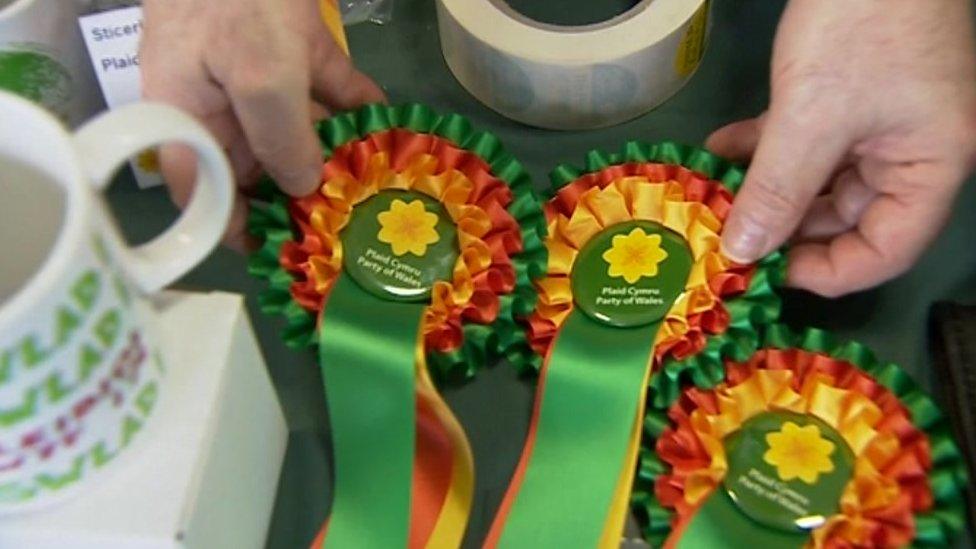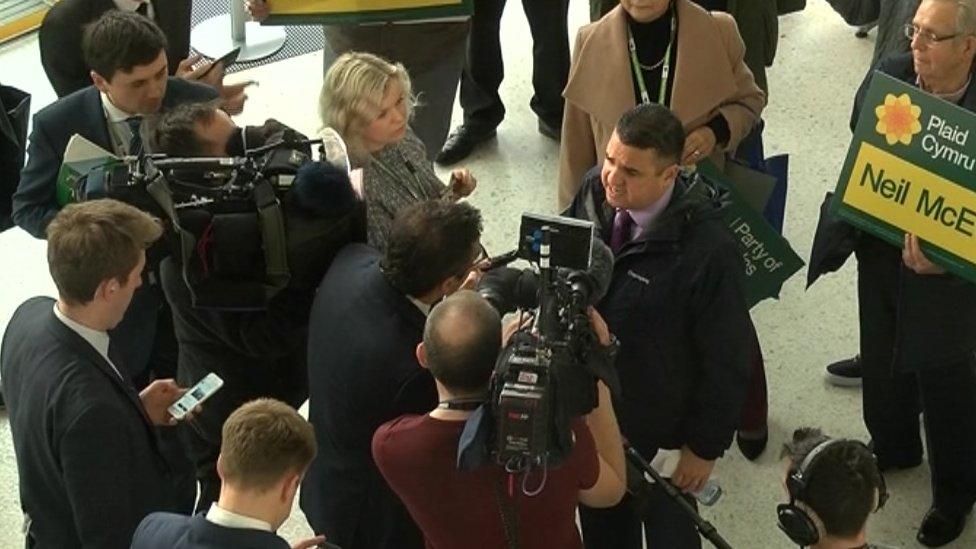Can Plaid Cymru take advantage in May?
- Published

Plaid Cymru's spring conference in Newport has been a difficult one to gauge.
The big question is whether the party can take advantage of the current vulnerability of Labour in the council elections in May.
There are two potential difficulties: one is the close working relationship with Labour at the assembly which could dent Plaid's ability to make gains, and the other is that it is looking to win control of councils in areas in the south Wales valleys which voted to Leave.
The party's pro-remain credentials were on display for all to see when, by far, Leanne Wood's biggest cheer in her speech came when she spoke about Wales being open to migrants with the right skills.
But as a number of party members told me, all of these factors will play second fiddle to the quality of candidates and the massive melting pot of local issues that will form the backdrop to the council election.
Centre stage
And then in the middle of it all came the decision to suspend as a councillor for a month Neil McEvoy, the man who is spearheading Plaid's campaigning in Cardiff.
His arrival at the Riverfront theatre to cheers from his supporters confirmed his status as Plaid's top publicity machine.
In typically outspoken fashion, he branded the Adjudication Panel for Wales a farce, but the decision poses problems for the party.
An official tribunal has upheld a complaint of bullying against him - a subject which Leanne Wood herself has campaigned strongly against.
The party's chair Alun Ffred Jones told me the one month suspension is less than he has seen dished out to other councillors on less serious issues than bullying but nevertheless Plaid knows it will come under pressure to take some kind of action after a judgement like this.

Compared to the last few conferences, which admittedly took place ahead of general and assembly elections and in the wake of Brexit, this felt a flatter affair, and may just be a reflection of where we are in the political cycle.
There was an interesting idea floated to raise a penny on income tax in Wales to help fund health and education, but frankly the next assembly campaign feels like an eternity away when you consider how much is yet to play out on Brexit before then.
Some of the more interesting conversations I had this weekend related to the dynamic within Labour, and whether a result like the Copeland by-election signals game-changing opportunities for other parties which did not exist before.
My sense is that Plaid knows it may not have a better chance to take lumps out of Labour's support, and as a result working closely with them at the Senedd for an extended period of time may not be in their best interests.
The counter view is that Brexit has created an exceptional time in which Plaid is prepared to work in the national interest, and sit round a table with Labour ministers.
'Elephant in the room'
This debate is continuing. The £1bn elephant in the room is a decision on the M4 relief road if the current public inquiry comes out in favour of the Labour Welsh Government-supported black route. If that happens, it's difficult to see the status quo continuing because of he level of opposition within Plaid.
Economic and geographic inequality was a major theme of Leanne Wood's speech. The criticism that too much goes to Cardiff, at the expense of the rest of Wales, had the feel of an old classic that had been dusted down from a shelf for the occasion, although she put the boot into the Cardiff city deal in a way we have not seen before.
Officials were keen to stress that this was not gratuitously kicking Cardiff, but making the case for spreading the wealth.
And it is undoubtedly good safe territory that will play well on the doorsteps in the council campaign, which is just what Plaid needs at this point in time.